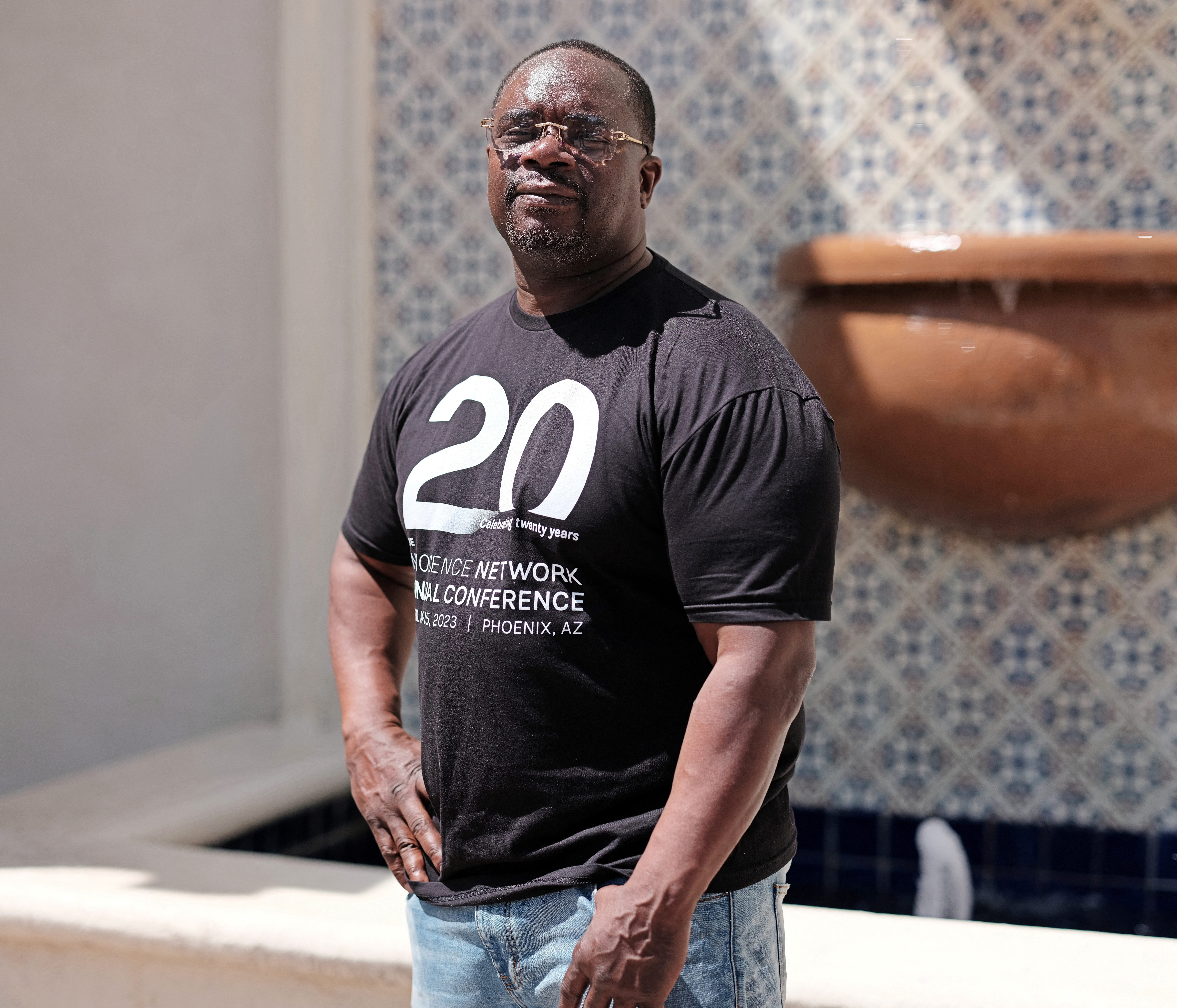American Criminal Justice Coalition seeks to abolish the “trial penalty”

[ad_1]

Rodney Roberts, who pleaded guilty to kidnapping for a crime he did not commit and spent 18 years in prison and civil custody before finally being exonerated by DNA evidence, poses in Phoenix, Arizona, US, in April 2023. Kenny Karpoff/Project/Handout Innocence via Reuters. No resale. There is no archive. This image has been provided Obtain licensing rights
WASHINGTON, May 3 (Reuters) – A group of 24 U.S. civil rights and criminal justice groups and advocates on Wednesday launched a coalition aimed at reforming sentencing so that people convicted at trial do not face harsher penalties than those who plead guilty to the same crime.
Activists are seeking to end so-called “trial sentencing” – longer prison terms for defendants who stand trial versus those who accept plea deals arranged with prosecutors, with people convicted at trial on average facing sentences three times longer.
Meet the End Punishment Trial Coalition. Organizations From across the ideological spectrum, from the American Civil Liberties Union, the Innocence Project, and the National Association of Criminal Defense Lawyers, to Right on Crime.
“I personally believe this will be a watershed moment for criminal justice in this country,” said Norman Reimer, a co-founder of the coalition and former executive director of the defense attorney group NACDL.
These efforts are complicated by the diffuse nature of the American criminal justice system, with district, state, and federal courts. This means the coalition will need to lobby Congress, state legislatures, courts, and local bar associations.
It expects to continue reforms that may include: eliminating or reducing the use of mandatory minimum sentences; giving judges more discretion to “look back” and adjust excessive sentences; remove language often used in plea agreements that require defendants to waive certain legal rights; and requiring plaintiffs to grant defendants access to all evidence against them regardless of whether they accept the petition.
The US Constitution guarantees the right to a fair trial by a jury of its peers. But despite popular culture depictions that make trials seem common, they are far less common than in the past, as prosecutors push for deals in which defendants plead guilty to the charge in exchange for the possibility of a more lenient sentence.
In 2022, 97.5% of all defendants in federal court pleaded guilty, according to a a report By the American Sentencing Commission, which studies and develops sentencing policies in the federal judiciary.
“‘Law & Order’ is always investigation, prosecution and trial,” said FAMM President Kevin Ring, whose criminal justice advocacy group is part of the coalition, referring to the popular TV show. “In the real world, you would have to watch 100 episodes just to watch two or three experiments.”
Proponents often tout plea agreements as a tool to make the justice system more efficient and less expensive. Defendants who plead guilty typically gain acceptance of responsibility for their crimes and spend less time in prison.
Criminal justice advocates point to the negative side. Defendants who have pleaded guilty do not have access to all of the evidence against them, and their rights of appeal are limited. Some of the defendants, according to the activists, feel pressured into accepting a plea bargain even when they are innocent just to avoid a potentially harsh punishment at trial.
The National Acquittal Registry, which collects information on acquittals of innocent criminal defendants, has tracked 3,300 acquittals since 1989.
Rodney Roberts, who was arrested in New Jersey in 1996 for theft, said he faced this dilemma himself. While in custody, the police told him that a 17-year-old girl who had been abducted and sexually assaulted had identified him as her attacker in the set of photos.
In court, a public defender gave him 20 minutes to decide whether to plead guilty to a lesser charge and serve two years of a seven-year sentence, or go to trial and risk a life sentence. Roberts agreed to a plea deal, but ended up serving 18 years in prison and civil detention before he was cleared with DNA evidence and released in 2014.
“I felt I had to choose between two evils: Lucifer and Satan,” Roberts said in an interview arranged by the Innocence Project. “I felt like I was betraying myself.”
(Reporting by Sarah N. Lynch; Editing by Mohamed for the Arabic Bulletin) Editing by Will Dunham and Scott Malone
Our standards: Thomson Reuters Trust Principles.
[ad_2]
Source link





